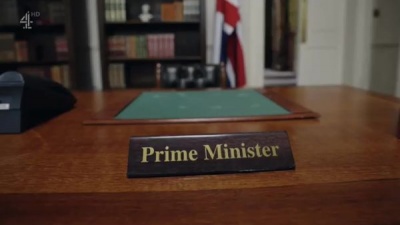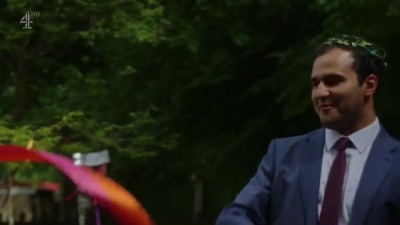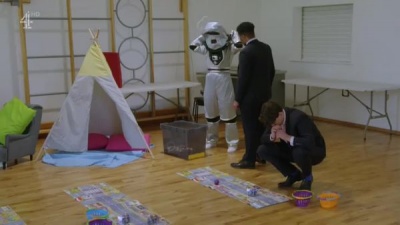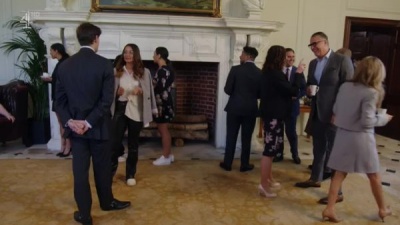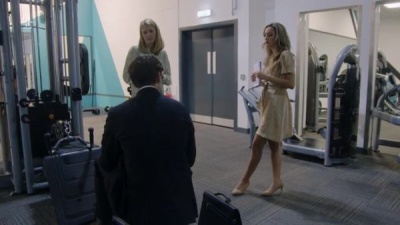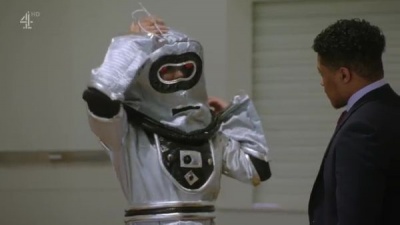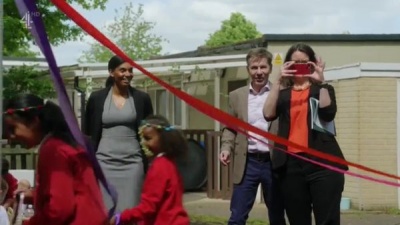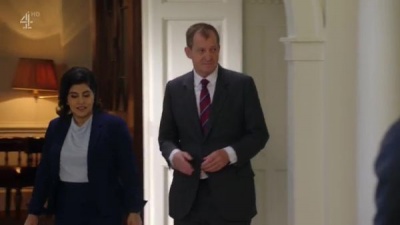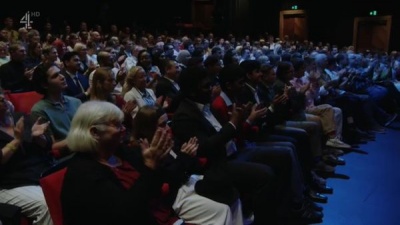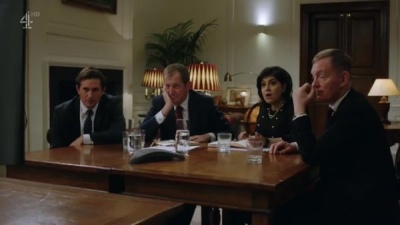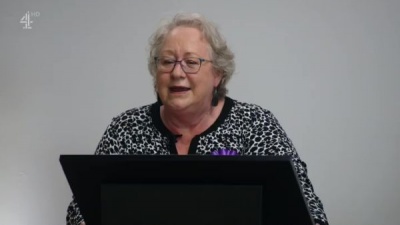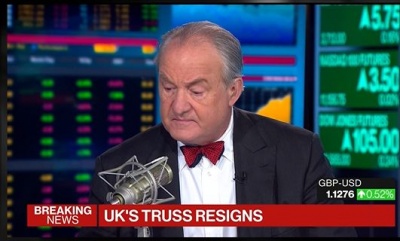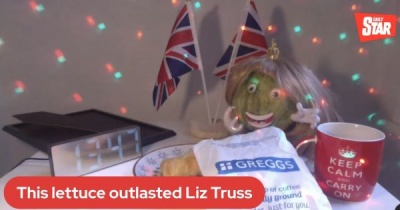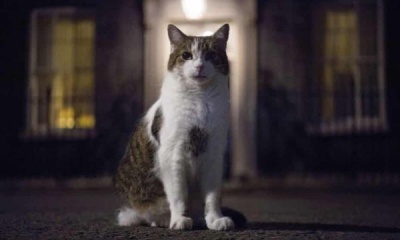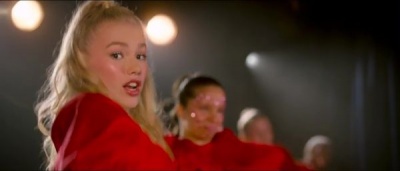Weaver's Week 2022-11-06
Last week | Weaver's Week Index | Next week
"Have you ever wondered what it would be like actually to govern Great Britain? Many recent prime ministers have."
Contents |
Make Me Prime Minister
Accidentally On Purpose (a TwoFour company) and Motion Content Group for Channel 4, 27 September – 1 November
Channel 4's mission is to challenge the status quo. That doesn't necessarily mean they'll undermine it, but it does mean they will ask hard questions. To do this in politics is tricky: far far too many politicians are tribal beasts, beholden to their group of choice.
Make Me Prime Minister ignored the tribal labels. It doesn't matter whether the contestants support the Children's Birthday Party, or the Greengrocery Party, or the Amphibians, or the Pimlico Independence Party, or any of the myriad other groupings.
Instantly, two lines of attack are shut down. "Oh, your party's policy says 'bleeeugh' but you're saying 'blaaaaah'." Who cares: these are people, not policies. And the viewers who support one party cannot say, "Bah, they're biassed against Reggie because he's a toad, and you know what the media's like with toads."
These candidates are assessed as people, as potential leaders. They are assessed on their fitness for office.
The opening narration repeats the national myths: that the office of prime minister is important. Exalted. Worthy of respect. And then the narration reminds us of how that mythology hasn't been upheld by Bozo The Chewtoy, the current (sub: please check) prime minister.
Three of the episodes followed a similar template. Split into two (roughly) equal teams, the contestants are set a topic. They're expected to come up with a relevant policy to improve people's lives.
The most important task, obviously, is to work out the policy. How will it work, who will benefit, who will pay? What do the experts in the field think, what evidence is there that this policy will actually improve people's lives? Episode one, for instance, took primary school education as the topic. One team – sorry, sorry, one party – offered the policy of one creative lesson per day, held outside the classroom.
What are the start-up costs? Teachers will need time to think about this new bit of the curriculum, what they can usefully do with the time out of the main room. There will need to be more assistants – one teacher might be able to look after 30 children in the classroom, but a group of 30 children in the village will need more than one adult. The knock-on effect to the rest of the curriculum – will this hinder efforts to read and write, to do arithmetic? What about the places that the children will visit – how will they cope with so many extra young visitors?
What are the ongoing costs? Five years down the line, there will still need to be more out-of-classroom assistants, perhaps more support for the places they visit. Has anyone else trialled this? From a very cursory search, we cannot find any large-scale experiments, and no evidence that the policy will actually improve anyone's life.
But, let's assume that the contestants have done better research than this column, and found a peer-reviewed paper in the Journal of Obscure Studies. How will they pay for their policy? They'll defund OFSTED, the schools inspection board.
This is going to make them very popular amongst teachers, who dislike OFSTED with a passion. But is it more that the teachers dislike the management culture indirectly inspired by the organisation? OFSTED runs high-stakes inspections, and can recommend that a school's leadership team be replaced. No senior manager wants to be fired, and fear of being elbowed out is going to percolate through the organisation.
Now, how much of this discussion was reflected in Make Me Prime Minister? Was it
a) all of it, in greater detail than we've given here.
b) some of it, in so little detail as to leave casual viewers confused.
c) none of it, none of it.
"We've had enough of experts"
No, the most important thing in Make Me Prime Minister is not the policy. It's to appoint a prime minister. Quite why anyone would take this poison chalice is unclear; if their team – sorry, their party – loses the public vote at the end, the PM will be invited to resign. But if they win, they mark their card as a positive for future episodes. Short-term risk for long-term gain, or something like that.
Some of the team might go out and talk to ordinary people about their proposed policy. Where do they find these ordinary people? Out in the shopping centres, in gyms and supermarkets, knocking on doors, opening windows. Are these people representative of the ordinary voter?
Will they understand the first thing our contestants are prittling on about? It's all very well to wave your hands and talk about "the social factors which affect health", but what are those factors? How do they make people unwell? What concrete steps will you take to improve people's lives? Politics in general – and Westminster politics in particular – is so abstract and filled with jargon as to be utter gibberish.
Say what you mean. Let yourself be understood by an intelligent person leading a busy life.
"Prime minister, why are you wearing a flame-retardant condom?"
Westminster politics still believes in the power of the dead-tree press, an arcane and ludicrously outmoded technology whereby last night's news website is printed on cheap paper, and sold for a sky-high fee. Before the days of electronic transmission, "newspapers" used to be very popular, but buying a newspaper is now a strange thing to do – in September, about 2.6 million papers were sold each day, and another 1.45 million freebies were given away. More people watch an average episode of Only Connect than buy a newspaper.
So, we can expect the contestants to be grilled by Two Reeds and the Wick of Twisted Flax, right? Er, wrong. In another snub to normal people's lives, the parties meet people from the dead-tree press. These hacks and opinion-frothers have a massive influence on Westminster, and their priorities shape the discourse in more "neutral" media such as television and radio. The scribblers bring their own biases to the events: by our reckoning the series saw four appearances by left-of-centre writers, three from a centre-right perspective (all from the one person), and five from the right-wing frotherati.
The aim is to do a "press launch", a stunt to make good television, or at least provide a few pictures. In this wholly artificial exercise, the hacks cosplay as journalists, and ask questions of the nominated prime minister. It's not a particularly helpful grilling, more an effort to undermine the PM's confidence and expose some weaknesses in their argument.
It's clear that the assessment is tailored to the skills of the judges. Alistair Campbell was a notorious "spin doctor", he fought and fought for the best possible coverage of his boss. Campbell often overstepped the boundaries expected of his job at the time, and became well-known in his own right. His main contribution to public life is baleful: to protect his own job, he set in motion a train of events that led to the BBC being emasculated, and the death of an MI6 officer. One can argue that Campbell bears responsibility for this obsession with presentation over substance, and hence is wholly unsuited to find out a good prime minister.
The other resident judge is Sayeeda Warsi, occasionally styled on screen as "Baroness Warsi". Like Campbell, Warsi has been around government without ever holding elected office. Unlike Campbell, Warsi has actually done government work, at the Foreign Ministry and as a cross-department minister for religion. Does this qualify her to find a good prime minister, given that she's only served under one of them?
The public have some input – there's a head-to-head "debate" between the two primes minister, each explains their policy and answer questions from the floor. This can be the ruining of some candidates, it can help others shine. Most often, it left us thinking "your policy wasn't thought through to begin with, the mock-up newspaper coverage was rubbish, and you're clearly floundering worse than a fishing catch".
The audience leaves, but not before they've voted for which leader they thought was best, or at least which leader they thought was less rubbish. That leader, and their entire party, is safe for another week. The losing PM is allowed to resign and leave the competition; if they don't, Campbell and Warsi will eliminate one of the losing team. Their decision is final, they will not accept discussion, and – in at least one case – they will not adequately explain their thoughts to the viewer. Make Me Prime Minister is a democracy, except when those in power think they can safely ignore the result.
Could you ruin the country?
A very different feel to one episode, where the parties faced a simulated crisis day. Riots on the streets of London! A nuclear submarine sinks off the coast of Sweden! Headlines give them headaches when they read them! A distributed denial-of-service attack knocks out the national grid, and culminates with a specific and limited and wholly illegal military operation in a faraway land. The crisis cabinets were judged by Campbell and Warsi, along with actually-elected people Johnny Mercer and Chris Bryant.
One team took proportionate and sensible decisions, defendable as good choices in a bad situation. The other made as many wrong decisions as they possibly could. Send in the riot police at the earliest moment, and inflame the situation. Pretend that there's nothing happening, and hope the Swedes won't notice a massive air-sea rescue operation, and then tell fibs to the ambassador when she calls in a Fïtovråge. Tell all sorts of fibs to the press, and finish the simulation by launching a massive missile at an industrial estate just outside Aden in the hope that it's hosting the cyberattack.
It was a massive carcrash on network television. It was a speedrun in how to ruin your reputation and look like complete amateurs. And it went out in the same week as the new prime minister on The News was trying to beat that record. "Hold my kitchen sink!" said Liz Rosebush and her finance minister Jimmy Quarterwit.
Although the programme presented itself as seeking an "alternative" prime minister, it had cast some familiar characters. Jackie Weaver, the parish council clerk who rose to fame through a viral video and has already done Celebrity Mastermind. Conall Doyle, a Big Thing on Tiktok, the video espionage platform. Danny Price is the son of music star Goldie, Holly Morgan played for Leicester City in the top flight. The cast was diverse, there were supporters of all main parties (apart from the Avians, for some reason). The cast ticked most of the boxes – racial diversity, some surprising characters, some who were exactly what you'd expect, at least one queer, some with medical problems. All human life was there.
By the semi-finals, we had pretty much got the hang of this show. Lots of talk about vague policies (crime prevention panels? Trust us, they're a talking shop, look great on your CV but get absolutely nothing done). Lots of chat with media giants like Krishnan Guru-Murthy, and also with some fly-by-night waffler from Bad FM. No engagement with the experts, their opinion is not sought by the candidates and not considered by the judges.
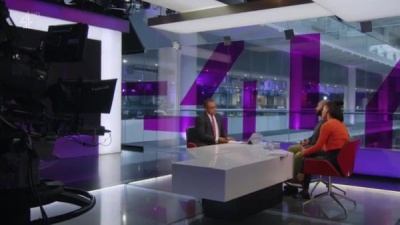 An interview with the Number One host.
An interview with the Number One host.
Prior to the series, each candidate had been asked to come up with A Big Idea. Natalie Balmain wanted to tackle tax avoidance, Kelly Given proposed houses for everyone, and Holly Morgan addressed institutionalised racism. In a twist familiar from Jamie Theakston's The Search (1), the finalists were allowed to choose an eliminated candidate to help them in the last week. Wonder if the finalists also carried around cheques so the prize would be split three ways? They filmed a video on a budget of 2p, and had an open-topped bus tour with friends and family as though they were a winning football team.
A big discussion of each candidate's policies took place in a big hall, complete with questions from Krishnan Guru-Murthy, and from the audience. The audience also chose their favourite candidate-slash-policy, and the most popular won the contest – and a cash prize of £25,000 (€ 29.000).
Sue Perkins contributed a snarky voiceover, she's one of the few talents who could out-snark Dave Lamb from Come Dine with Me. Justin Nicholls composed a sharp score, lots of strings and plenty of classical intimations. Editing was sharp and to the point, and the programmes included a little footage of politicians from The News. The credits say this was an original idea devised by Matt Edmondson and Rees Howell for Accidentally On Purpose.
We've had enough of politicians
This isn't the first time television has tried to turn politics into a game. Election went out on CBBC in autumn 2008, the winner got an audience with the prime minister at the time (whoever that would turn out to be). Its format was minor challenge, major challenge, and the losing team would have one of their number told "Your campaign's over". Take away the educational aspect, add in a bigger budget, and Make Me Prime Minister is a simple retread of Election.
Other critics have argued that Make Me Prime Minister falls between stools, neither foolish enough for reality television nor having the gravitas of politics done well. But the news is dominated by a contest where the prime minister loses to Coral Butterhead, a lettuce from the Greengrocery Party. Real life is even stupider than "let's fib and say our submarine was drifting". Campbell has no claim to the moral ground when he says "you bombed Aden without justification". The contestants may have been cosplaying as politicians, but so are the judges, and so are many real-life politicians.
For our money, Make Me Prime Minister held up an accurate mirror at the political classes. They're utterly full of themselves, and utterly divorced from the rest of us. For politicians, the most important thing is to win elections by proposing popular policies. In this column's view, the important thing is to win elections by proposing policies that will actually make people's lives better. But the environment in which politicians operate ensures they literally cannot do that. People who know what they're talking about are ignored, there's too much credence to a cannibalistic group of "journalists", the spin and presentation is everything.
We keep coming back to the complete lack of expert contribution. Nobody on this show is able to call on actual solid facts. It's all opinions and emotions and bluster and waffle. No wonder we're in the state we're in; when ideology meets the real world, the real world will kick your philosophy where it really hurts. Ask Karl Marx. Ask Ayn Rand. Ask John Stuart Mill.
That's what Make Me Prime Minister showed us. The truth, however much we don't like it.
In other news
What happened to Quincy the winner of Election? IMDB reckons he's become a podcast producer; whatever he's doing, we wish him well.
Bother's Bar mentioned Derek Laud, a big name in 2005 politics and Big Brother 6 contestant. Turns out that he's left the cut-and-thrust world of politics, and returned to the finance sector. Partner in a private bank, and chair of the foundation board for Lucy Cavendish College at Cambridge. Does any of this contribute to the public good? That's for you to decide.
Awards season RTS Scotland presented its awards this week. One game show winner – Antiques Road Trip in the Daytime category.
The British Film Designers Guild interests us. Celebrity Karaoke Club and Celebrity Best Home Cook are up for Best Production Design in a Light Entertainment TV Programme, along with about a dozen other shows. Winners to be announced on 18 February.
Champion! Pen/Campwyr is a new sports quiz for S4C. Three players answer questions to win an advantage in virtual games against Welsh sporting legends. Jason Mohammad hosts.
The Skye Vote Song "Lose my head" will be the BBC's debut entry at Junior Eurovision. The song's performed by Freya Skye, who comes across as sassy and in control. The song is a mid-to-uptempo disco number, it would slide easily into any contemporary hit playlist. With a good staging – and the routine in the video is a great model – this could go very far indeed. We'll have more (much more!) after the contest has taken place on 11 December.
Pointless has come to the end of new episodes, at least until the new year. Richard Osman left the show in the summer, and they've tried to replace him with a series of Guest Friends. Not all of them have had the same chemistry, in our view Stephen Mangan was by far the most natural and at-home in the studio. Sally Lindsey was very clearly reading scripts off the laptop. Lauren Laverne was very good with the contestants – she'd be a great host for her own cosy quiz – but this isn't the best role for her. Nothing wrong with anyone's performance, but it's not the same as we're used to.
Viewers have reacted with their remotes. Pointless has fallen in the ratings, these new episodes are barely above Tipping Point and alarmingly close to the viewership for repeats. In fairness, ratings are always lower before the clocks go back, so there's no need to panic yet. Equally, the BBC might look for other shows to trial in the 5.15 slot, because we can clearly see that Pointless isn't going to be around for ever.
Most-published A reader has passed us a paper magazine, with a column headlined "By far the UK's most-published column by the same author - now in its 41st year". The magazine is at issue 970. "Haven't you done more editions of the Week?" asks our correspondent. Indeed we have, though this is merely our 22nd year publishing. This is edition 1096 of the Week, of which two editions were written by our colleagues at Bother's Bar.
But this certainly isn't the most-published column by the same author. For that honour, we nominate James Masterton of chart-watch.uk. This week, he marks thirty years chronicling the singles charts. From "End of the road" to "Anti-hero", via songs both classic and remembered only as winning answers on Pointless. A labour of love, James' generous spirit adds to the greater understanding of pop music. Whether ephemeral or lasting, all is chronicled with care and opinion. Many congratulations, and here's to the next anniversary.
This week we learned:
- The Bangladesh Rice Research Institute has created new saltwater-resistant strains of rice. Normal rice doesn't grow well in salt water, as the salinity weakens the rice stalks. Farmers have also adapted, creating farms that float on the inundating sea water. (Pointless)
- "La bamba", as in the Los Lobos single, translates as "The bamba". Its literal translation is "The goat", and – jings! – to dance the goat you need to have a little gracefulness. (Only Connect)
- Bono from U2 says he was named after a shop. This surprised us, as we thought he was named after a dog biscuit. (House of Games)
- Birds of prey in captivity have their feet cleaned for them. Their talons are washed using a regular toothbrush and toothpaste. (Blue Peter)
Quizzy Mondays had a Tuesday edition this week, and slipped by 15 minutes. More shows should start at quarter-past the hour.
An outstanding performance on University Challenge, where Jesus Cambridge beat St Catherine's Oxford by 225-105. It could have been much bigger, the lead was 135-15 at one point, and contestants Hamish MacGregor and Sumit Aggarwal seemed to dominate the buzzers. St Catherine's got themselves back in the game, and only narrowly miss a repêchage spot.
Strigiformes beat Peacocks on Only Connect, 28-20 the final score. A high-scoring first round talked about things in red and blue, which somehow got onto a discussion of sometime Epicurian and The Krypton Factor champion Aaron Bell. Whatever happened to him, eh? They had a knock-knock joke in reverse, and the Strigiformes took three points from each Sequence. But it was the missing vowels round where they wrapped up the win, eight right answers before their opponents could pull one back.
A low-scoring Mastermind was won by Darren Ross, who took the Jacobite Rebellion of 1745. He just held off Gaynor Melling (Rupert Bear) by a single point.
We're not publishing next week, so here's a double bill of things to watch. I'm a Celebrity... Get Me Out of Here! begins tonight (VM1 and ITV), preceded by a special edition of The Masked Singer. BBC2 gets a new series of QI (Fri). Dave asks, isn't it time for Outsiders (Wed 16th). Advance notice for the 20th, when BBC4 has the double-bill for all ages: Crackerjack followed by Young Jazz Musician of the Year.
Quizzy Mondays is on Tuesday both weeks.
Pictures: Accidentally On Purpose (a TwoFour company) and Motion Content Group, R Stevens, Bloomberg, Daily Star, BBC.
To have Weaver's Week emailed to you on publication day, receive our exclusive TV roundup of the game shows in the week ahead, and chat to other ukgameshows.com readers, sign up to our Google Group.


